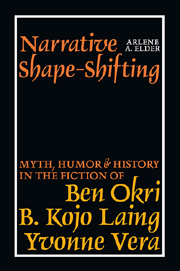 Narrative Shape-Shifting
Narrative Shape-Shifting Concluding and …
Published online by Cambridge University Press: 05 April 2013
Summary
Form and content in discourse are one
(M.M. Bakhtin, the location of culture)Perhaps it is due to my embracing the continuing stories of the oral tradition; my being intrigued by postmodern narrative's indeterminacy; and/or, my amusement with my brother ending every sentence in our conversations with ‘… and’, a verbal ploy to keep the exchange going that so marks his personality, that I recognise the validity of the well-known concept of aesthetic unity repeated in Bakhtin's bare-bones version above. Its truth echoes from my every source for observation, literary and otherwise. Therefore, faced with the dilemma of ‘ending’ my own contribution to a vibrant and growing consideration of Ben Okri, B. Kojo Laing, and Yvonne Vera, three giants of contemporary African fiction, I discover I have only two aims, the first being far more important than the second. In this ‘conclusion’ I would like to offer a brief statement that reiterates and highlights the ongoing ‘conversations’ I hear the works of my chosen writers having with each other, and, of lesser significance (except for my own sense of form) I thereby suggest my awareness of the artificiality of having divided my study, for the purpose of clarity, into separate chapters. After all, the story I have attempted to tell is as interwoven as the tapestry created by Okri’s old woman in the woods.
- Type
- Chapter
- Information
- Narrative Shape-ShiftingMyth, Humor and History in the Fiction of Ben Okri, B. Kojo Laing and Yvonne Vera, pp. 148 - 150Publisher: Boydell & BrewerPrint publication year: 2009


